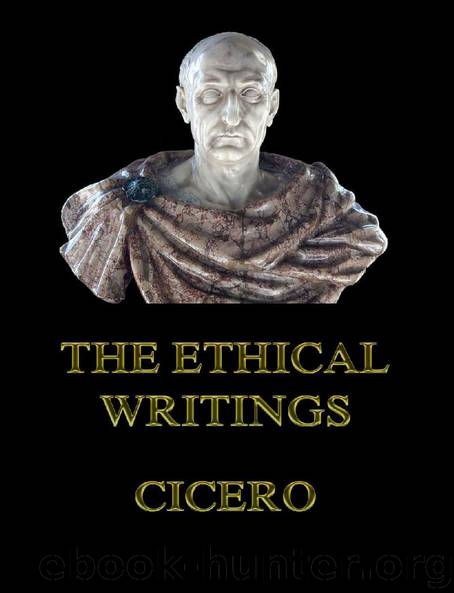The Ethical Writings by Cicero

Author:Cicero [Cicero]
Language: eng
Format: epub
Tags: Philosophie
Publisher: Jazzybee Verlag
Published: 0101-01-01T00:00:00+00:00
Ref. 108
Illiberales, unworthy of a free man.
Ref. 109
For men of senatorial, or even equestrian rank, these employments, if practised for gain, were regarded as derogating from respectability.
Ref. 110
The Romans in general, till near the last days of the republic, despised commerce, and though they depended for grain in great part on Sicily and remoter provinces, it was long before they brought grain in their own ships. In Cicero’s time, however, it was the reproach of the equestrian order that many members of it, tired of genteel poverty, were enriching themselves by commerce; and Cicero, as a parvenu in the Senate, was weak enough to fall in with this foolish prejudice.
Ref. 111
Merchants, engaged in traffic from port to port, owned and commanded the ships that carried their goods.
Ref. 112
Latin, contentio et comparatio, — stretching two objects side by side, and determining their comparative length. See § 17.
Ref. 113
A Stoic idea. The Stoics derived all duty from nature, — the nature of things, the nature of man. They therefore made nature the sole test of duty, and (if I may so express what in less awkward phrase would be less clear) regarded the greater or less naturalness of a duty as the criterion of its relative importance.
Ref. 114
Σο ϕία primarily meant sagacity, but is commonly employed to denote wisdom in its broadest sense.
Ref. 115
Φρόνησις means prudence, in the sense of practical wisdom.
Ref. 116
Otium, leisure; negotium = nec otium, business, — a favorite play upon words with Cicero, which we have not the means of rendering into English.
Ref. 117
Posidonius was a Stoic, a disciple of Panaetius, a voluminous writer on an encyclopedic range of subjects. Of his works only fragments are preserved, and happily the catalogue of things not fit to be done has left no traces of itself. His works are known chiefly by copious extracts made by Athenaeus.
Ref. 118
An inference so illogical as to seem an oversight.
Ref. 119
After the assassination of Caesar, when for a very little while there seemed some hope of a return to republican institutions in fact as well as in name.
Ref. 120
Latin, ars; but art is here an inadequate rendering.
Ref. 121
In Hortensius.
Ref. 122
That of the New Academy.
Ref. 123
Cratippus was a Peripatetic, and thus regarded Aristotle as his master; but as Aristotle derived much of his philosophy from Plato, and Plato, much or all of his from Socrates, Cicero, with more rhetorical aptness than literal truth, antedates the school of which his son was the pupil.
Ref. 124
A syllogism in Barbara.
Ref. 125
A verse from some lost poem, probably the Prometheus of Attius.
Ref. 126
For instance, wool, at the proper time of shearing.
Ref. 127
This work has entirely perished. Dicaearchus, a contemporary and follower of Aristotle, was a copious writer in the departments of geography and history, as well as of philosophy. One of his books on “The Life of Greece,” if we may judge by the fragments of it that remain, would have been worth more than all other extant records of Athenian life in his age.
Ref. 128
I do not know
Download
This site does not store any files on its server. We only index and link to content provided by other sites. Please contact the content providers to delete copyright contents if any and email us, we'll remove relevant links or contents immediately.
The Rules Do Not Apply by Ariel Levy(4969)
Bluets by Maggie Nelson(4556)
Too Much and Not the Mood by Durga Chew-Bose(4348)
Pre-Suasion: A Revolutionary Way to Influence and Persuade by Robert Cialdini(4232)
The Motorcycle Diaries by Ernesto Che Guevara(4101)
Walking by Henry David Thoreau(3962)
Schaum's Quick Guide to Writing Great Short Stories by Margaret Lucke(3381)
The Daily Stoic by Holiday Ryan & Hanselman Stephen(3322)
What If This Were Enough? by Heather Havrilesky(3311)
The Day I Stopped Drinking Milk by Sudha Murty(3197)
The Social Psychology of Inequality by Unknown(3031)
Why I Write by George Orwell(2954)
Letters From a Stoic by Seneca(2799)
A Short History of Nearly Everything by Bryson Bill(2698)
A Burst of Light by Audre Lorde(2607)
Insomniac City by Bill Hayes(2558)
Feel Free by Zadie Smith(2481)
Upstream by Mary Oliver(2390)
Miami by Joan Didion(2368)
